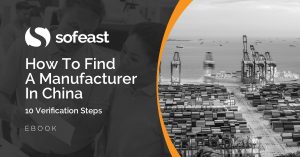 I frequently lament about the number of importers who take high risks by not doing any quality control. But the most under-rated tool to reduce risks in China is certainly running a background check on potential suppliers.
I frequently lament about the number of importers who take high risks by not doing any quality control. But the most under-rated tool to reduce risks in China is certainly running a background check on potential suppliers.
I listed 6 tips below, from the easiest to the most advanced and expensive.
1. Choose the right target
Do not waste time searching for information about the company mentioned in the salesperson’s signature, or on the trade show’s booth. They might actually steer you toward another company when the time comes for payments.
Ask for the company name and address that will be mentioned on the invoice. Or, better yet, ask for a pro forma invoice (if both parties already have a good idea of the products & pricing) and look at the company name on that document.
2. Spot unscrupulous companies
There are two ways to notice unscrupulous companies.
The first one is to tell potential suppliers that you’ll have their factory audited before any PO is issued, and later their production inspected before any shipment is authorized. Mention it right away, from the first encounter/email. If the supplier refuses it or looks flaky, it is a red flag!
(By the way, factory audits are the right tool to verify a supplier’s claims about their production capability. Most quality control firms, and some sourcing agents can audit a factory based on a checklist that corresponds to your needs. Prices range from 300 to 900 USD for one day of work, in the main production areas.)
The second one is to search these databases of the Chinese Supreme Court. Search the Chinese name of their company (in China, not in Hong Kong), and see if you find it there. You will be able to see if they were given a sentence and if they failed to pay the damages. Unfortunately, this is only available in Chinese.
3. Make good use of search engines and B2B directories
Open Google or Bing and search “[company name] + scam”, “[company name] + dishonest”, and a few variations. Importers who got a bad experience often try to leave a trace about it on the web (example here).
While searching the supplier’s company name, you will likely find the profiles they created on several B2B directories. Look at the addresses and phone numbers associated with the supplier’s company. If they are not the same, or if the supplier doesn’t respond when you give him a call, he will have some explaining to do.
If the company has a paying account on a B2B directory, some information on their profile might have been verified by the directory itself:
- For example, Global Sources checks important data (depending on the amount of the contract) such as start date, number of staff in each department, factory ownership, amount of sales, brand names, and so on.
- On the contrary, be careful with Alibaba. A “Gold Supplier” status means nothing. Read here about a real-life example of a supplier that was taking advantage of it.
In any case, the general tendency is to show more and more of these data out there, in the open. It contrasts strongly with China’s culture of opacity, and I think it is a very good thing.
With a Google search, you might also see that they participated in trade shows recently. This is a good sign. A booth is an investment to get new customers. And the repeated presence in the same trade show is the sign of a company that cultivates relationships with the same customers.
And here is a pro tip, in case the company shows a photo of a nice factory. Is it really theirs? Or did they get it from another website? Head to https://images.google.com and upload the image. Google will show you identical/similar images on other websites.
 (Note: Baidu can do the same thing — we use https://image.baidu.com when we run a background check.)
(Note: Baidu can do the same thing — we use https://image.baidu.com when we run a background check.)
4. A sample request is a good occasion to check two things
If you need to pay for the initial sample charge, insist on wiring money on their company bank account. If they can’t give you that information, they are probably not a serious supplier.
If you need to pay the courier fee for sending the samples, don’t just give your account number to the supplier — instead, ask your courier to pick the samples up. This way, you know the supplier’s address, and you can compare it to the address on their business registration (which you should have asked for beforehand).
5. Background checks, on the cheap
I recently found China Checkup, which provides background check services that correspond to foreign buyers’ needs.
And, over at Sofeast, we can also provide a supplier background check service to our clients, as a good complement to factory audits. The price for checking one company is only a few hundred dollars.
Note that the target company is NOT aware that one of their customers is running this type of verification on them. In many cases, though, the customer should be proud of it — it shows they are a serious customer, investing to build a solid and long-term supplier base.
6. Background checks, together with professional advice
If you don’t like a DIY solution, a lawyer or accounting firm that works in China can help you. If you are not familiar with Chinese business practices, they can smell inconsistencies or red flags and warn you.
If you are about to place a large order with a new supplier, I highly advise to work with a lawyer, both for due diligence and for drafting an OEM agreement.
Note that, in this case, the supplier knows an investigation is under way. Again, I believe importers should not be apologetic about this.
—
Any other tips?
PS: I will delete comments that are advertising in disguise.
Are you wondering how to find a manufacturer in China who is well-suited to your needs and can also deliver on their promises?
Sofeast has developed 10 verification steps to help you find the right manufacturer. They’re shared in this FREE eBook: “How To Find A Manufacturer In China: 10 Verification Steps.”
It covers:
- Background checks
- Manufacturing capabilities
- Quality system auditing
- Engineering resources
- Pricing, negotiation, & contracts
- …and much, much more
Just hit the button below to get your copy:


Useful post !!The 3rd point is the first way and also the cheapest way to investigate the suppliers. Another tips is.. read more your articles(just joking..ha ha)!!
Thanks!
With a bit of experience, a lot of red flags that are not obvious to new-to-China buyers become fully visible.
Great post Renaud, as always. I’d also recommend hktdc.com as another trustable B2B directory, similar to Globalsources.
Thanks Veronika. I don’t know HKKTDC as well as GS. Never heard bad things about them 😉
hi mr renaud
very good stuff. i would like to know if same procedures are also good for importing from sri lanka.
thank you
No idea! I don’t know Sri Lanka at all. I guess these tips need to be adapted to local challenges.
Renaud,
Great stuff so far in the first 3 lessons! One comment and one question for you… One of the first things we do when evaluating a potential supplier is do a quick google search on their mobile phone number. It often provides us great insight into what other businesses they are connected too. Now for the question – Should it be a red flag is they are using an email address from one of the free services like the China equivalent to yahoo versus a company domain name? It seems a great deal of the suppliers we contact do not have a company email address.
Thanks Jim.
Searching the mobile phone number is a great idea. I had not heard about this before.
Using a @yahoo.com.cn address is not necessarily a red flag. But it is not a very good sign. See https://www.qualityinspection.org/professionalism-chinese-suppliers/, part 2.
All solid, insightful info! The last part though about the manufacturer being aware they are under investigation, reminds me of Rosemary Coates’s book “42 Rules for Sourcing and Manufacturing in China” where she contrasts the difference between a 5 star factory review and the real shadow factories that some manufacturers use in response to aggressive buyer pressure on product pricing.
Thanks Mason!
“By the way, factory audits are the right tool to verify a supplier’s claims about their production capability”
Renaud, production capability is amount of units produced per month? If so, how can factory audit verify this? There are also manufacturers with readily available reports done by 3rd party inspection company but again, how is this verified?
Thanks
No, number of pieces produced in a month is capacity. And an auditor can often evaluate it roughly — for example, if there is a clear bottleneck, count the number of pieces made in 1 hour.
By capability I mean what they can really make and with what level of reliability and precision. A good auditor can evaluate this.
As you can guess, any paper shown by the factory is to be considered suspect…
Okay I see where I have been confused. But when approximating rough production capacity, what is clear bottleneck? If it’s what I think, i.e. soemthing unpredicted in production like slowdown or production suspection, how can we know how many times this happens per month? Is there defined industry average taken into account or it’s per factory basis?
No, bottleneck(s) are not unpredictable. There is always at least one bottleneck and it is not a bad thing in itself. I’d recommend you read The Goal by Eli Goldratt, and you will grasp this concept completely.
Great article and also useful for investigation information. Every organization should do the background check for their employees/members and also suppliers etc. We should hire the background check company for background check.